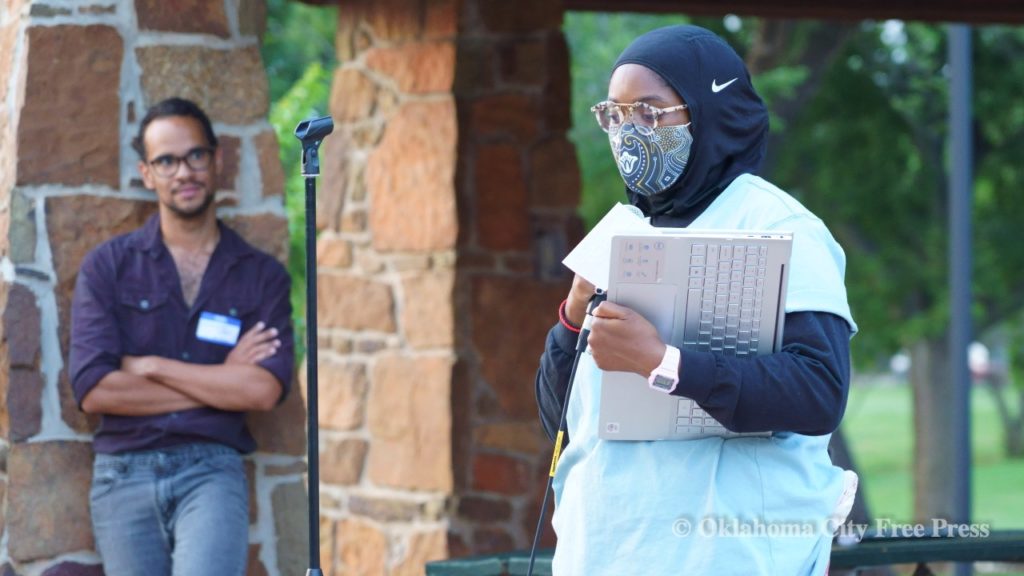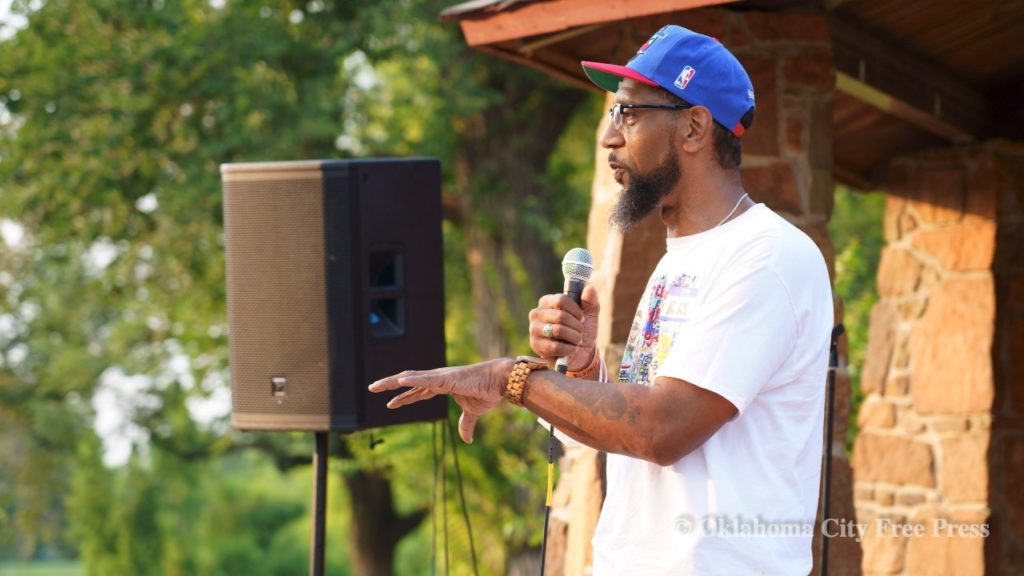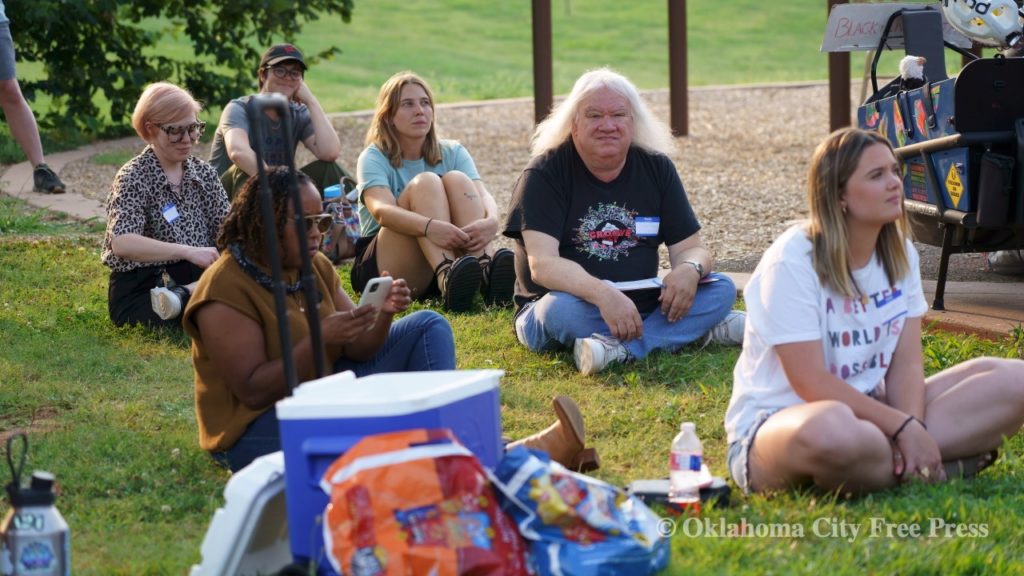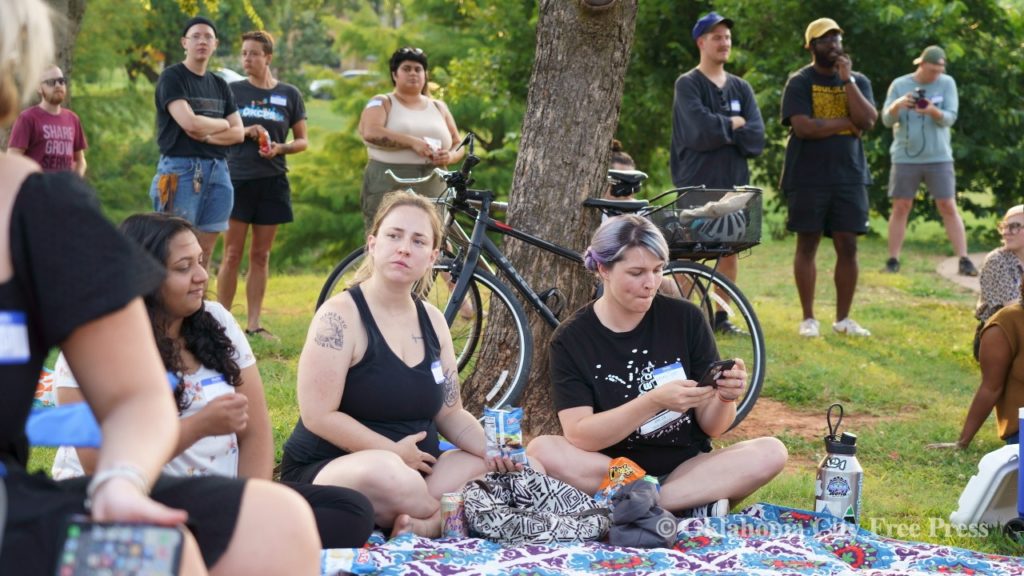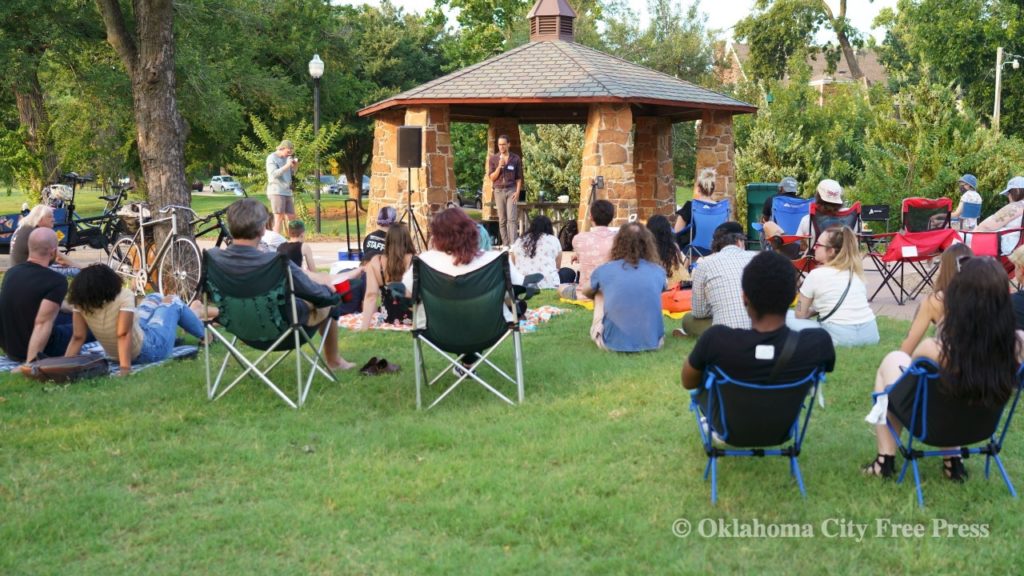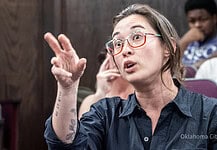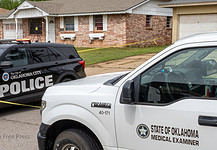Last Updated on July 22, 2021, 1:57 PM | Published: July 22, 2021
OKLAHOMA CITY (Free Press) — Oklahoma City community members expressed their ideas and concerns about policing and public safety reforms during a listening session Wednesday.
The well-organized event, called “Reimagine Community Policing Listening Session” was held by OKC Councilman James Cooper and State Representative Mauree Turner in Edgemere Park near N.W. 36th and Walker. About 80 people were there by the end of the evening. The park sits in Cooper’s OKC Ward 2 and Turner’s state HD-88.
In stark contrast to the loud, chaotic George Floyd protests of summer 2020, the meeting represented a more deliberate process phase of efforts toward policing reform in Oklahoma City.
And, the evening was far more than a gripe session.
The expressions of concern Wednesday included the sorrow of the mother of Stavian Rodriguez, killed by Oklahoma City Police Department (OKCPD) officers, and encouragement by other commenters to find better ways for the City to respond to homelessness and mental health crises.
It was one of many steps planned for the Oklahoma City Law Enforcement Task Force first announced on July 1, 2020. A consulting firm, 21cp Solutions, was hired by the City Council in a 5-3 vote in December 2020 to give structure and guidance to the task force.
To learn more about the task force, see our explainer:
City Law Enforcement Task Force advances with consultant, public doubts
The event also featured comments from Ray Kelly, the community organizer and civilian oversight public consultant with 21CP who is directly engaging the community under the Task Force contract.
Sobering numbers
Cooper gave some key statistics at the top of his presentation before members of the public were allowed to weigh in.
The often-quoted Mapping Police Violence study shows that the OKCPD comes in SECOND in the nation for police killings from January 2013 through December 2020.
In spite of so many calls for the police budget to be reduced and the savings spent on community stabilization, the Oklahoma City Council’s new budget for Fiscal Year 21/22 contains the largest police budget in the City’s history ringing in at $240 million according to Cooper.
He also pointed out that in addition, though, the City budgeted $1.3 million for three task forces that will work on policing issues in OKC which is a new part of the budget.
Council support
Councilman Cooper gave a rundown of the six points of a resolution passed unanimously by the City Council of Oklahoma City June 16.
Cooper portrayed the vote as a surprise but it came from serious efforts of communication between council members in one-on-one conversations with OKCPD Chief Wade Gourley and other council members.
The six initiatives were:
- Increasing the number of officers who receive Crisis Intervention Training (CIT),
- Officer Access to Mental Health Services,
- Alternative Response to Mental Health Calls,
- Focus on Youth Outreach,
- Expansion of Homeless Outreach Initiatives, and
- Creation of a Neighborhood Safety/Violence Interruption Program.
Taskforce work on these items is underway starting this summer with the event Wednesday being one of the first very public engagement sessions led by 21CP.
21CP’s Ray Kelly
A key infusion of energy and a fresh set of eyes on Oklahoma City’s policing reform efforts is provided by the arrival of 21CP Solutions consulting firm and their community organizer, Ray Kelly.
“I think it’s important that we reiterate what the Councilman said, where this is an opportunity to build on the ideas and structures and place,” said Kelly. “And, please, just make sure that moving forward to change the numbers, one thing we create is a community-informed process.”
He said that 21CP has a concept called “intentional listening” and is expressed by a line he had on his T-shirt. “It says we are community and community is the answer.”
Kelly, who is black, observed that most of the people who were there were white and that the response to policing reform ideas often from white communities is that there are no problems with the police and white individuals often say that they have not had a problem with the police.
“But, one thing we’ve learned in doing this work is when you actually reform a police department or advocate to change a police department, we have to recognize that you can’t change police protocol for one neighborhood,” said Kelly.
Kelly added that once changes start being made to change a police department “you can’t change police protocol for one neighborhood.”
“So, when we consider these changes that we’re going to make, we have to consider changes that are going to be equitable throughout the whole city,” Kelly said. “And that’s the key word that we have to understand today in this fight that we do reimagine for public safety and advocating for this change is about equity.”
He said that the change that will happen will not just impact one part of the city or one group of people but the whole city.
“So, we don’t have to think in terms of how changes to the police will impact me, but more, how can we have equal treatment for every community in Oklahoma City and leverage the privilege that most of you have of not having a negative interaction with the police. So, that’s the thought process.”
Kelly said that unless we create the funding and the further resolutions to bring about change “then we’re perpetuating the status quo.”
Public comments
Here is a brief list of the core concepts expressed by attendees once invited to come to the mic and comment.
Peter said that the police often arrive after something has happened, so why not have a range of options for who will respond to different circumstances such as mental health professionals responding to a mental health crisis.
Collin was concerned about how having police officers in schools too often results in children being put into the carceral system instead of having their issues addressed in adequate ways that consider their age.
Ky said that every time he sees the Oklahoma County Jail “a piece of my heart dies.” He said the jail is “one of the worst places you can possibly go to in the U.S.,” and wants the reform work to also consider the jail.
Nicole said, “It would be a travesty if we invested a single additional dollar in policing.” Nicole said that she doesn’t want a “rebrand” of the police or “community policing” but questioned the concept of policing because it “is not equitable.”
Allie pointed out that in the suburban wards people often see the police as “holding back the evil from getting you.” Allie said that one way to address that is to actually question the metrics of how the police use their budget each year because every other department in the city has to do that except for the Police Department.
Jess Eddy delivered scalding criticism of the police and the City Council and City leaders. He said that the police are “an immoral, inhumane killing force that is out here depriving people of their lives without consequence, without retribution without justice.”
Cameo Holland, mother of 15-year-old Stavian Rodriguez shot and killed by several officers after he had put his gun on the ground. He would have been 16 last week. “People of color are disproportionately mistreated and killed by the police,” said Holland. “But being white or looking white won’t necessarily save you either. These people do not care about really anything but themselves.”
Kennedy encouraged anyone who has financial resources, especially like those represented by the homes around Edgemere Park, to give at least 10% away to help others. Kennedy listed several “free fridges” around the community that always need contributions.
Emily was concerned about how the police treat the homeless and the least powerful in the City. “We’re all a community. We all deserve to make it home at the end of the night whether that’s at a home we go to or we are sleeping in a park.”
Peyton closed out the comment time by calling attention to the Citizen’s Advisory Board which is intended to “hold police accountable” but does a very poor job essentially because they only review investigations that the police do on themselves. He encouraged everyone to put more attention and pressure on City Manager Craig Freeman to hold the Police Department accountable because Chief Wade Gourley answers directly to Freeman.
Response
Ray Kelly, the 21CP organizer responded and thanked all who made their comments.
“I share a lot of your concerns and your thoughts,” Kelly said. “And that’s actually what it takes to initiate real change. I’ve heard a lot of great things. I’ve heard a lot of discouraging things. And the one thing I want everyone to understand is, this is systemic change. The system is not going to change itself.”
Among his responses to the comments, Kelly was direct about the problems with the current Citizens Advisory Board (CAB).
“[The] first course of action is addressing the charter that creates the CAB, that allows for lifetime terms, that has no independence, no investigatory power and none of the things needed to actually hold a police department accountable.”
He said that the subcommittee provides an opportunity to propose changes to the city charter and push hard for term limits for those who are on the CAB.
Afterward, Free Press asked Representative Turner how they thought the event went. Turner said at first it looked like no one was going to show up but then they kept coming and turned into a good crowd.
Did the dynamics work the way they wanted? “I wanted to have like, an organic space, for people to be open and honest about how they feel about these things,” said Turner.
“That to see if we could create a policy packet that really kind of spanned from all the municipality to the state,” Turner said.
The effort is to find a way to work collectively in the meantime and gathering during that time for events like that was one way to do that gathering.
Founder, publisher, and editor of Oklahoma City Free Press. Brett continues to contribute reports and photography to this site as he runs the business.


